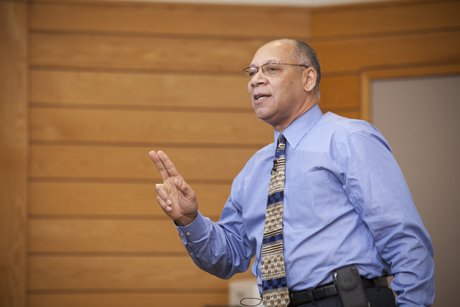Workshop addresses subtle acts of exclusion
By Nancy Doolittle

Raw potatoes were passed around and people were deliberately ignored during the first seminar offered through Cornell’s Inclusive Excellence Academy for all staff and faculty, Jan. 15 in Goldwin Smith Hall. The Inclusive Excellence Academy, launched in August 2013 and supported by the University Diversity Council to advance the Toward New Destinations initiative, addresses specific areas of diversity and inclusion through workshops, seminars and lectures.
The January seminar by Ernest Hicks, retired manager of corporate diversity at Xerox Corp., focused on ways in which people who are perceived to be “different” are made to feel excluded, discouraged rather than engaged, overlooked rather than valued. Called micro-inequities, these subtle behaviors that can rise to the level of discrimination are often unintentional, hard to prove and unrecognized by the perpetrator, but have a significant impact on the recipient.
Inclusive Excellence Academy
The Inclusive Excellence Academy was established to support efforts of colleges and administrative units to address multicultural competency as a way to improve climate, one of the goals of the Toward New Destinations diversity initiative. The academy will offer several programs this spring, targeted to specific constituent groups and to the entire university (and local) community around such topics as planning accessible events at Cornell, “wonder women,” inequality without racism, inclusive recruiting strategies, and culturally inclusive labs and research groups.
They range from simple actions such as looking at one’s watch or answering a text message while someone is talking, to more extreme ones such as reprimanding someone in public, undermining a person’s credibility publicly or overruling his or her decisions.
The difference between incivility or rudeness and micro-inequities, Hicks said, is that rude behaviors occur occasionally, but micro-inequities happen when a person’s biases surface and target, consciously or unconsciously, those who are perceived as being different. They create a hostile environment if left unchecked, he said.
To illustrate the harmful effects of micro-inequities, Hicks asked attendees to pair off. While one person talked, the other would at first use active listening skills and affirm what was said, then switch to checking the time, texting and showing disinterest. Exploring the feelings of the people disrespected during this exercise, Hicks said the pervasiveness of micro-inequities in organizations can lead to a decrease in productivity, sharing ideas and taking risks; increased turnover; poor morale and interpersonal relationships; and low self-esteem.
Hicks provided some ways to combat micro-inequities. One of those is to bring them to the attention of a person using them. Another is to “be aware of your own stereotypes and prejudices,” he said. Recognize that it is human nature to do more for those we know and that those we know tend to be more like ourselves, he said. Instead, “be inclusive and help people feel welcomed.”
In a work or group setting, certain actions create an environment that is conducive to inclusion. Common goals will override differences between people. Open and positive communication, expecting the best from all staff, creating team spirit, giving public recognition and appreciation, being approachable, providing a positive physical environment, making staff evaluation a positive experience and finding reasons to celebrate all are ways to create a positive, supportive work environment, he said.
As for the potatoes? Hicks asked each potato-holder to write a short note of appreciation on the potato to another person and give that person the potato to read. The exercise would continue for the duration of the talk.
The purpose? To show just how easy it is to make someone feel appreciated and included, Hicks said.
Hick’s lecture is posted on CornellCast.
Media Contact
Get Cornell news delivered right to your inbox.
Subscribe